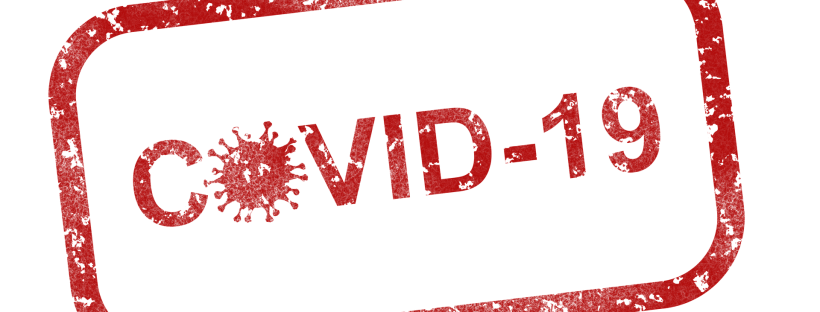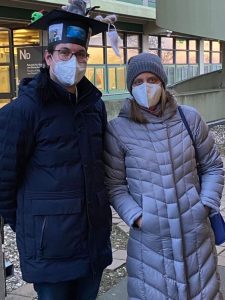 Dominik Beyer defendet his Ph.D. with the title “Molekular mechanisms of mania- and depressive like behavior in animal models”. We congratulate him warmly and wish him all the best for the future.
Dominik Beyer defendet his Ph.D. with the title “Molekular mechanisms of mania- and depressive like behavior in animal models”. We congratulate him warmly and wish him all the best for the future.
Category: Uncategorized
Congratulations Dr. Widmann!
On Tuesday, O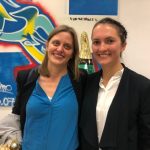 ctober 26th Annina successfully defended her MD thesis with the title “Impaired cognitive self-awareness mediates the association between alexithymia and excitation/inhibition balance in the pgACC”. Verry well done! We wish you all the best for your future!
ctober 26th Annina successfully defended her MD thesis with the title “Impaired cognitive self-awareness mediates the association between alexithymia and excitation/inhibition balance in the pgACC”. Verry well done! We wish you all the best for your future!
DGBS Annual Conference in 2021
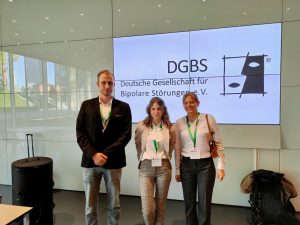 From 23 September to 25 September 2021, the 20th DGBS Annual Conference took place in Heilbronn. In 2019, Prof. Dr. Nadja Freund was awarded the Jules Angst Research Prize as a young scientist in the field of bipolar disorder. In 2020, no annual meeting took place due to the pandemic. This year, Kirsten Schmerder was honored to give a lecture entitled “Does sleep deprivation make us sick? A study of photoperiod lengths manipulation in mice” as a speaker.
From 23 September to 25 September 2021, the 20th DGBS Annual Conference took place in Heilbronn. In 2019, Prof. Dr. Nadja Freund was awarded the Jules Angst Research Prize as a young scientist in the field of bipolar disorder. In 2020, no annual meeting took place due to the pandemic. This year, Kirsten Schmerder was honored to give a lecture entitled “Does sleep deprivation make us sick? A study of photoperiod lengths manipulation in mice” as a speaker.
The next DGBS Annual Conference will take place from 15.09. – 17.09.2022 in Frankfurt am Main. Hope to see you there!
Two in one fell swoop
Karina Violou and Selina Wagner were able to successfully complete their master’s thesis in our working group. Karina completed her master’s thesis entitled “Immune response during developement and its impact on mental health” in July 2021 and Selina Wagner was able to write her master’s thesis entitled “Investigation of neurobiological consequences of early life stress in the rat animal model” in August 2021. We congratulate both of them on this success and wish them all the best for their future.
Defense via ZOOM
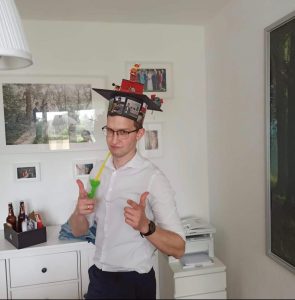 Today we can rejoice with David Wegrzyn. He successfully defended his P.hD. thesis entitled “In vitro analysis of the synaptogenesis and the formation of perineuronal nets in the Poly I:C mouse model considering the role of activated microglia“. His defense took place via ZOOM due to the pandemic, but he also mastered this hurdle confidently. We are proud of his achievement and congratulate him warmly. All the best for your future David.
Today we can rejoice with David Wegrzyn. He successfully defended his P.hD. thesis entitled “In vitro analysis of the synaptogenesis and the formation of perineuronal nets in the Poly I:C mouse model considering the role of activated microglia“. His defense took place via ZOOM due to the pandemic, but he also mastered this hurdle confidently. We are proud of his achievement and congratulate him warmly. All the best for your future David.
The junior scientists
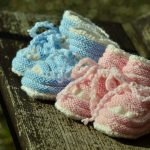 Not only professionally but also in our private life fantastic things happened.
Not only professionally but also in our private life fantastic things happened.
Prof. Dr. Nadja Freund pioneered in July 2019 and gave birth to little Keno. In October 2020 Dominik Beyer followed her in becoming parent when his son Florentin was born. Just four months later, in February 2021, Prof. Dr. Martina Mann’s became grandmother to little Linnea. In March 2021, Emma Maria was born, making Jennifer Koch a proud mum.
Last but not least, in May 2021 David became father to little Sophie. We wish the parents all the best. The next generation of young scientists is assured.
Covid-19 Update 2021
Covid-19 will be with us for this year and maybe beyond. Our laboratory is trying to make the best out of the situation. We continue organizing research and teaching our students as best as we can. On-site work at our laboratories continues follwing Corona specific rules like self-testing, distance, masks etc. continues as well as online meetings and remote office. 2020 taught us we can work together as a team in tough situations. We took our place in the fight against the Covid-19 pandemic. Members of the work group supported the LWL- University clinic in giving vaccines to employees. Future outlook is positively (at least rather negatively). We hope everything will be fine soon. Stay safe- stay healthy.
Congratulations Alesja
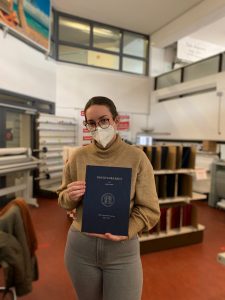 The pandemic has been with us for over one year and but we have to go on. We are all the more pleased that Alesja Radini was able to succsessfully complete her bachelor thesis with us. She submitted her work with the title “Neurobiological correlates of mania- and depression- like behavior in the guanylyl- cyclase knock- out mouse” in April.
The pandemic has been with us for over one year and but we have to go on. We are all the more pleased that Alesja Radini was able to succsessfully complete her bachelor thesis with us. She submitted her work with the title “Neurobiological correlates of mania- and depression- like behavior in the guanylyl- cyclase knock- out mouse” in April.
Successful establishment of our animal model for bipolar disorder in Bochum
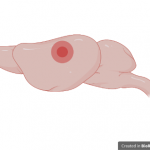 In our new published study Prefrontal dopamine D1 receptor manipulation influences anxiety behavior and induces neuroinflammation within the hippocampus Dominik, Nadja and Annika investigated the effects of dopamine D1 receptor (D1R) over-expression and its termination on anxiety and the inflammatory state within the hippocampus. Interestingly, termination of D1R over-expression resulted in increased anxiety and inflammation. In addition, anxiety as well as inflammatory state correlated positively.
In our new published study Prefrontal dopamine D1 receptor manipulation influences anxiety behavior and induces neuroinflammation within the hippocampus Dominik, Nadja and Annika investigated the effects of dopamine D1 receptor (D1R) over-expression and its termination on anxiety and the inflammatory state within the hippocampus. Interestingly, termination of D1R over-expression resulted in increased anxiety and inflammation. In addition, anxiety as well as inflammatory state correlated positively.
Find out more about the study here (link: https://pubmed.ncbi.nlm.nih.gov/33683478/)
Welcome back
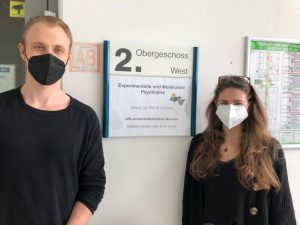 We are very pleased to welcome Florian Rehrmann and Kirsten Schmerder back to our group. After Florian successfully completed his master’s thesis in our laboratory in 2020, he is now back as replace for Jennifer Koch during her maternity leave. We couldn’t ask for a better one for these tasks, as Florian got to know the laboratory and the processes very well during his master’s thesis.
We are very pleased to welcome Florian Rehrmann and Kirsten Schmerder back to our group. After Florian successfully completed his master’s thesis in our laboratory in 2020, he is now back as replace for Jennifer Koch during her maternity leave. We couldn’t ask for a better one for these tasks, as Florian got to know the laboratory and the processes very well during his master’s thesis.
Kirsten also successfully completed her master’s thesis with us in 2020 and is now returning to our work group as a doctoral candidate. During her PhD, she will continue her research and hopefully deepen our knowledge about neurobiological processes during depressive and manic episodes in bipolar disorder models. She will implement optogenetic approaches to be able to interfere with the dopaminergic system during behavioral assessment.
We are looking forward working together (again).
